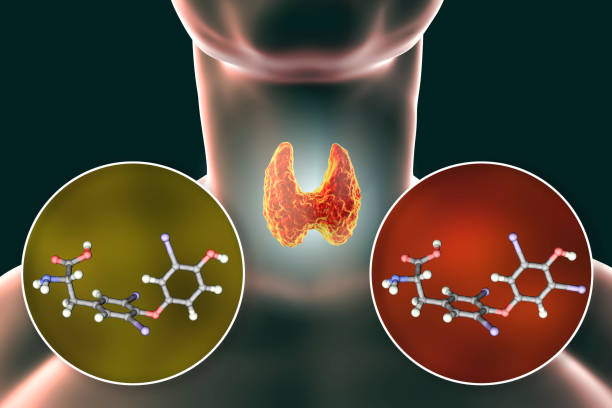Hashimoto’s disease, also known as chronic lymphocytic thyroiditis, is a condition that interferes with the normal functioning of the thyroid gland. The thyroid gland is located at the base of the neck, below Adam’s apple, and produces hormones that regulate the rate of metabolism in the body. This means that the thyroid gland regulates the amount of energy consumed by the various organs and tissues in the body.
Triiodothyronine (T3) is the T3 hormone, and thyroxine (T4) is the T4 hormone. The pituitary gland, another endocrine gland that produces thyroid stimulating hormone, also known as TSH, monitors and regulates thyroid gland functions.
What exactly is Hashimoto’s disease?
An autoimmune disorder occurs when the immune system of the body produces antibodies that attack healthy cells as if they were bacteria, viruses, or other foreign bodies. Hashimoto’s disease is an autoimmune disorder in which the immune system attacks the thyroid gland, causing thyroid hormone production to decrease. As a result, people with Hashimoto’s thyroiditis suffer from hypothyroidism, which is also a symptom of an underactive thyroid.
How is Hashimoto’s disease diagnosed?
Hashimoto’s disease affects the following groups of people;
- Women, especially those over 35 years of age or pregnant
- People from families with a history of thyroid disorders
- Radiation exposure
- Those suffering from other autoimmune diseases
If left untreated, Hashimoto’s thyroiditis progresses gradually and causes irreversible health problems. The eventual decline in thyroid hormone levels causes the following Hashimoto’s thyroiditis symptoms, which are similar to hypothyroidism and other thyroid disorders:
- Fatigue
- Vulnerability to cold
- Dry skin
- Muscle weakness
- Joint stiffness and pain
- Depression
- Memory and concentration problems
- Heat intolerance
The symptoms of Hashimoto’s disease are also very similar to those of other medical conditions, such as old age. People suffering from Hashimoto’s disease should consult a doctor as soon as the symptoms appear for a proper diagnosis. Symptoms may also differ from one patient to the next.
To determine the underlying cause, healthcare providers will ask you questions about your symptoms, review your medical history, and perform extensive physical exams. There are two methods for determining Hashimoto’s thyroiditis;
Hormonal tests for Hashimoto’s thyroiditis
Blood tests are used by doctors to determine the number of thyroid hormones in the bloodstream. Thyroid Stimulatory Hormone (TSH) produced in the pituitary gland monitors and regulates thyroid gland function; high TSH levels may cause the thyroid gland to produce more thyroid hormones, resulting in hyperthyroidism. If TSH levels are normal, the doctor will check thyroid hormone levels, particularly thyroxine, or T4, the primary thyroid hormone.
The antibody test for Hashimoto’s thyroiditis
An antibody test is the second method for determining whether a patient has Hashimoto’s disease. Rogue antibodies produced by some people’s immune systems may attack healthy cells in the body, including the thyroid gland. The presence of these antibodies in the bloodstream may result in less thyroid hormone production.
Before starting treatment, doctors perform a blood test to see if the antibodies that cause Hashimoto’s disease are present. Thyroid peroxidase antibody (TPO) is the most commonly used antibody test for Hashimoto’s thyroiditis diagnosis and monitoring thyroid peroxidase antibody (TPO) is the most commonly used antibody test for Hashimoto’s thyroiditis diagnosis and monitoring. If other tests reveal that you have an autoimmune disease, this test is performed.
Hashimoto’s disease treatment
People suffering from Hashimoto’s disease may not require any medication at all. Some patients with Hashimoto’s thyroiditis are subjected to repeated tests for up to six months to track progress in thyroid hormone fluctuations. Doctors recommend hormone replacement therapy to patients diagnosed with chronic Hashimoto’s disease, which may include normal levels of the thyroid stimulating hormone TSH and low thyroid hormone levels.

To treat hypothyroidism and Hashimoto’s thyroiditis, patients may also use dietary supplements that do not involve the administration of synthetic hormones.
T4 hormone replacement therapy for an underactive or missing thyroid gland
T4 hormone replacement therapy seeks to restore the function of a thyroid gland that has become inactive or to replace one that has been surgically removed. This is what distinguishes it from other forms of treatment.
Low TSH levels or iodine deficiency may result in fewer thyroid hormones, particularly the T4 hormone, which causes Hashimoto’s disease. T4 thyroid hormone replacement restores hormonal balance, thereby alleviating Hashimoto’s disease symptoms.
Levothyroxine, which is biologically equivalent to T4, is available as the thyroxine hormone. This treatment option is primarily prescribed in tablet form, but gel capsules and liquid medication are also available.
The only risk associated with T4 replacement therapy is an overdose or underdose. As a result, it is critical to walk with a qualified physician to monitor T4 levels and ensure they are within the normal range.
There are no known side effects associated with levothyroxine. Some foods, supplements, and medications, however, may interfere with the body’s ability to absorb levothyroxine, rendering it ineffective. It is best to consult your doctor before consuming any of the following;
- High fiber foods
- Iron supplements, including multivitamins
- Calcium supplements
- Soy products
- Cholestyramine
- Aluminum hydroxide, found in some antacids
Dietary supplements
Some of the products derived from animals are rich in T3 and T4 hormones. These products can be used as thyroid hormone supplements.
There are, however, a few concerns about these supplements;
- T3 and T4 hormone balance in animals is not the same as in humans. This may result in hormonal imbalance in humans, with undesirable symptoms similar to Hashimoto’s thyroiditis.
- It is impossible to determine the exact amount of T3 and T4 hormones in these animal products, making it impossible to recommend a proper dose.
T3 Hormone replacement for Hashimoto’s disease
T3 is the active form of thyroid hormone and is primarily formed when T4 is converted into T3 as needed.
T3 hormone, on the other hand, has a shorter half-life than T4. As a result, the T3 synthetic equivalent, Cytomel, must be taken several times per day to remain in the bloodstream. This causes additional issues because high levels of T3 can cause unpleasant symptoms such as rapid heartbeat, insomnia, and anxiety.
T3 can also be detrimental to the heart and bones. High levels of T3 in the bloodstream prevent the body from converting T4 to T3. T3 is rarely used alone as a hormone replacement therapy for Hashimoto’s disease treatment due to these unpleasant side effects.
T3 and T4 are present in some hormone preparations, such as thyrolar. These combinations typically include more T3, which the body normally produces, and may result in similar side effects as when using T3. As a result, despite the short lifespan of T3 in the bloodstream, thyrolar is frequently administered once daily.
Looking for Personalized Hormone Replacement Therapy? Visit Meridian Health and Wellness in Atlanta, GA
Meridian Health has qualified professional healthcare practitioners who specialize in treating chronic illnesses such as hypothyroidism and Hashimoto’s disease. We treat the underlying cause rather than the symptoms, which allows our patients to fully recover from autoimmune diseases and other chronic diseases that cannot be treated with prescription medication alone. Our bioidentical hormone replacement therapy helps restore the normal functioning of dysfunctional organs and body parts, which resolves other undiagnosed health issues.
When the body’s hormonal levels begin to fluctuate after the age of 35, most people develop Hashimoto’s disease. Hashimoto’s disease can start as a hormonal imbalance and then progress to erectile dysfunction, low libido, weight gain, anxiety, lack of motivation, and other menopausal symptoms. Our natural treatment for Hashimoto’s thyroiditis also treats other autoimmune diseases by restoring hormonal balance and the proper functioning of various body systems.
Lauren and Heather have a combined 19 years of experience in hormonal therapy, and their joy is seeing patients enjoy good health after visiting their Georgia clinic. The benefit of this treatment is that it has no side effects, and you can incorporate it into your healthy lifestyle. Meridian Health Clinic also believes in educating its patients on the importance of living a healthy lifestyle through proper nutrition and lifestyle changes. In a nutshell, the patient is at the heart of our operations.
We provide a personalized approach to the treatment of all medical conditions, particularly autoimmune diseases and chronic conditions. Before developing a custom treatment plan for your condition, we listen to your health concerns, perform thorough medical checks, and run several tests. Both men and women can benefit from our bioidentical hormone therapy.
Hashimoto’s disease, if left untreated, can lead to mental health issues, sexual dysfunction, goiter, pregnancy complications, and heart failure. If you are experiencing thyroid problems, such as an enlarged thyroid, or if you have been diagnosed with any autoimmune disease, please contact us at (470) 344-5780 to schedule an appointment with one of our experts.


